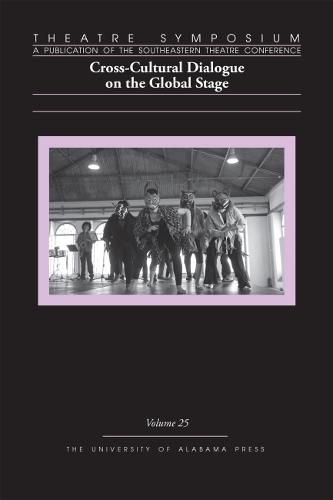Readings Newsletter
Become a Readings Member to make your shopping experience even easier.
Sign in or sign up for free!
You’re not far away from qualifying for FREE standard shipping within Australia
You’ve qualified for FREE standard shipping within Australia
The cart is loading…






Addresses the ways that theatre both shapes cross-cultural dialogue and is itself, in turn, shaped by those forces. Globalization may strike many as a phenomenon of our own historical moment, but it is truly as old as civilization: we need only look to the ancient Silk Road linking the Far East to the Mediterranean in order to find some of the earliest recorded impacts of people and goods crossing borders. Yet, in the current cultural moment, tensions are high due to increased migration, economic unpredictability, complicated acts of local and global terror, and heightened political divisions all over the world. Thus globalization seems new and a threat to our ways of life, to our nations, and to our cultures. In what ways have theatre practitioners, educators, and scholars worked to support cross-cultural dialogue historically? And in what ways might theatre embrace the complexities and contradictions inherent in any meaningful exchange? The essays in Theatre Symposium, Volume 25 reflect on these questions. Featured in Theatre Symposium, Volume 25: i?1/2Theatre as Cultural Exchange: Stages and Studios of Learningi?½ by Anita Gonzalez i?1/2Certain Kinds of Dances Used among Them: An Initial Inquiry into Colonial Spanish Encounters with the Areytos of the Taino in Puerto Ricoi?½ by E. Bert Wallace i?1/2Gertrude Hoffmann’s Lawful Piracy: aEURO~A Vision of Salome’ and the Russian Season as Transatlantic Production Impersonationsi?½ by Sunny Stalter-Pace i?1/2Greasing the Global: Princess Lotus Blossom and the Fabrication of the aEURO~Orient’ to Pitch Products in the American Medicine Showi?½ by Chase Bringardner i?1/2Dismembering Tennessee Williams: The Global Context of Lee Breuer’s A Streetcar Named Desirei?½ by Daniel Ciba i?1/2Transformative Cross-Cultural Dialogue in Prague: Americans Creating Czech History Playsi?½ by Karen Berman i?1/2Finding Common Ground: Lessac Training across Culturesi?½ by Erica Tobolski and Deborah A. Kinghorn
$9.00 standard shipping within Australia
FREE standard shipping within Australia for orders over $100.00
Express & International shipping calculated at checkout
Addresses the ways that theatre both shapes cross-cultural dialogue and is itself, in turn, shaped by those forces. Globalization may strike many as a phenomenon of our own historical moment, but it is truly as old as civilization: we need only look to the ancient Silk Road linking the Far East to the Mediterranean in order to find some of the earliest recorded impacts of people and goods crossing borders. Yet, in the current cultural moment, tensions are high due to increased migration, economic unpredictability, complicated acts of local and global terror, and heightened political divisions all over the world. Thus globalization seems new and a threat to our ways of life, to our nations, and to our cultures. In what ways have theatre practitioners, educators, and scholars worked to support cross-cultural dialogue historically? And in what ways might theatre embrace the complexities and contradictions inherent in any meaningful exchange? The essays in Theatre Symposium, Volume 25 reflect on these questions. Featured in Theatre Symposium, Volume 25: i?1/2Theatre as Cultural Exchange: Stages and Studios of Learningi?½ by Anita Gonzalez i?1/2Certain Kinds of Dances Used among Them: An Initial Inquiry into Colonial Spanish Encounters with the Areytos of the Taino in Puerto Ricoi?½ by E. Bert Wallace i?1/2Gertrude Hoffmann’s Lawful Piracy: aEURO~A Vision of Salome’ and the Russian Season as Transatlantic Production Impersonationsi?½ by Sunny Stalter-Pace i?1/2Greasing the Global: Princess Lotus Blossom and the Fabrication of the aEURO~Orient’ to Pitch Products in the American Medicine Showi?½ by Chase Bringardner i?1/2Dismembering Tennessee Williams: The Global Context of Lee Breuer’s A Streetcar Named Desirei?½ by Daniel Ciba i?1/2Transformative Cross-Cultural Dialogue in Prague: Americans Creating Czech History Playsi?½ by Karen Berman i?1/2Finding Common Ground: Lessac Training across Culturesi?½ by Erica Tobolski and Deborah A. Kinghorn